【优质】两篇阅读句子翻译和段落翻译以及答案
七年级上册(部编版)古文课内外比较阅读(答案+译文)
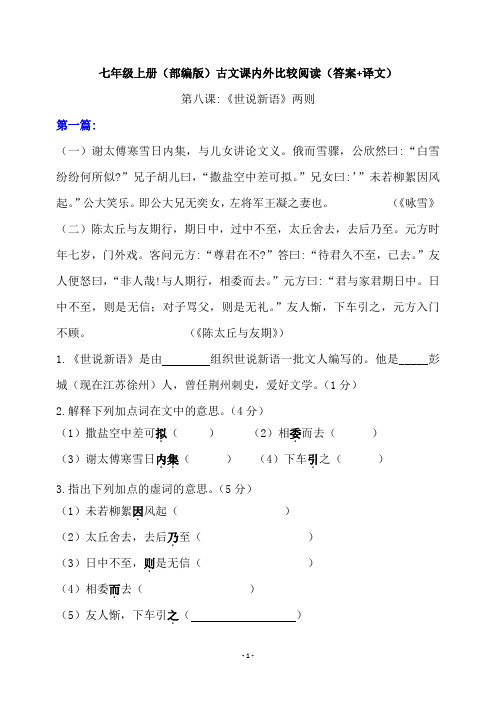
七年级上册(部编版)古文课内外比较阅读(答案+译文)第八课:《世说新语》两则第一篇:(一)谢太傅寒雪日内集,与儿女讲论文义。
俄而雪骤,公欣然曰:“白雪纷纷何所似?”兄子胡儿曰,“撒盐空中差可拟。
”兄女曰:’”未若柳絮因风起。
”公大笑乐。
即公大兄无奕女,左将军王凝之妻也。
(《咏雪》(二)陈太丘与友期行,期日中,过中不至,太丘舍去,去后乃至。
元方时年七岁,门外戏。
客问元方:“尊君在不?”答曰:“待君久不至,已去。
”友人便怒曰,“非人哉!与人期行,相委而去。
”元方曰:“君与家君期日中。
日中不至,则是无信;对子骂父,则是无礼。
”友人惭,下车引之,元方入门不顾。
(《陈太丘与友期》)1.《世说新语》是由组织世说新语一批文人编写的。
他是_____彭城(现在江苏徐州)人,曾任荆州刺史,爱好文学。
(1分)2.解释下列加点词在文中的意思。
(4分)(1)撒盐空中差可拟.()(2)相委.而去()(3)谢太傅寒雪日内集..()(4)下车引.之()3.指出下列加点的虚词的意思。
(5分)(1)未若柳絮因.风起()(2)太丘舍去,去后乃.至()(3)日中不至,则.是无信()(4)相委而.去()(5)友人惭,下车引之.()4.用现代汉语写出下列句子的意思。
(4分)(1)未若柳絮因风起。
()(2)非人哉!与人期行,相委而去。
()5.文中出现了“君”“家君”“尊君”三个称谓语,你能用自己的话来说说他们的意义与区别吗?(3分)()6.《咏雪》结尾交代了谢道韫的身份,有何用意?(2分)()7.上述两文都选自《世说新语》且都在字里行间表达了对睿智儿童的赞许之意。
文中谢道韫和元方的聪颖机智分别表现在哪个方面?请用自己的语言来回答。
(3分)()()【参考答案】1.刘义庆2.(1)相比(2)丢下、舍弃(3)家庭聚会(4)拉3.(1)趁着、乘着、(2)才(3)就(4)表承接(5)代词、代友人。
4.(1)还不如把它比作成柳絮乘着风飘起。
(2)真不是人!和别人约好一起出行,却丢下别人自己离开了。
《短文两篇》阅读附答案

《短文两篇》阅读附答案《短文两篇》阅读附答案《短文两篇》阅读附答案1夸父与日逐走,入日;渴,欲得饮,饮于河、渭;河、渭不足,北饮大泽。
未至,道渴而死。
弃其杖,化为邓林。
共工怒触不周山昔者,共工与颛顼争为帝,怒而触不周之山,天柱折,地维绝。
天倾西北,故日月星辰移焉;地不满东南,故水潦尘埃归焉。
1、解释下列语句中划线的词语。
(4分)(1)夸父与日逐走() (2)饮于河、渭()(3)怒而触不周之山() (4)地维绝()2、用现代汉语翻译下列句子。
(4分)(1)弃其杖,化为邓林。
(2)天倾西北,故日月星辰移焉。
3、从这两篇短文可看出夸父和共工性格中的共同点是什么?(2分)答案1、(1) 跑 (2)到 (3)碰、撞 (4)断 (4分)2、(1) 他丢下的手杖,化成了桃林。
(2分) (2) 天向西北倾斜,所以日月星辰都朝西北方向移动。
(2分)3、他们都很勇敢、坚强,敢于挑战权威(夸父敢于与太阳赛跑,共工敢于与颛顼争帝)。
(2分)《短文两篇》阅读附答案2夸父逐日夸父与日逐走,入日;渴,欲得饮,饮于河、渭;河、渭不足,北饮大泽。
未至,道渴而死。
弃其仗,化为邓林。
1、解释下列加点的`字词(2分)夸父与日逐走欲得饮2、翻译句子。
(4分)(1) 夸父与日逐走,入日。
________________________________________________________________ _____________(2) 未至,道渴而死。
________________________________________________________________ _____________3、作为成语典故,夸父逐日常用来比喻_________________________________________________________________ (2分)4、从这个故事中,你看到了夸父哪些优秀品质?(3分)答:5、弃其仗,化为邓林应如何理解?(2分)答:________________________________________________________________ __________参考答案:1、竞跑,赛跑想要2、(1)夸父与太阳竞跑,一直追到太阳落山的地方。
多文体阅读段落翻译

Unit one Is Google Making Us Stupid:What the Internet Is Doing to Our Brain?1.英语原文what the Net seems to be doing is chipping away my capacity for concentration and contemplation .My mind now expects to take take for information the way the net distributes it ;in a swiftly moving stream of particles .Once I was a scuba diver in the sea of words.Now I zip along the surface like a guy on a Jet Ski .译文:什么网做的却似乎是在削弱我的专注和沉思的能力。
我现在的想法是希望通过用网络分发的方式来获得信息:在一个快速移动的电子流中。
我曾是一个在字海中的潜水员,现在我像是骑着摩托艇在海面是上飞驰。
2.英语原文When,in March of this year,the New York Times decided to devoted the second and third pages of every edition to article abstracts,its design director,Tom Bodkin,explained thatthe“shortcuts”would give harried readers a quick "taste" of the day's news,sparing them the "less efficient "method of actually turning the pages and reading the articles .Old media have little choice but to play by the new-media rules.译文:今年3月份,在纽约时报决定投入第一和第三页每版的文章摘要,其设计总监Tom Bodkin,解释说,“捷径”使得忙碌的读者可以快速“体验”当天的新闻,代替他们以前的“低效率”的方法:翻页阅读文章。
短文两篇阅读理解习题及答案
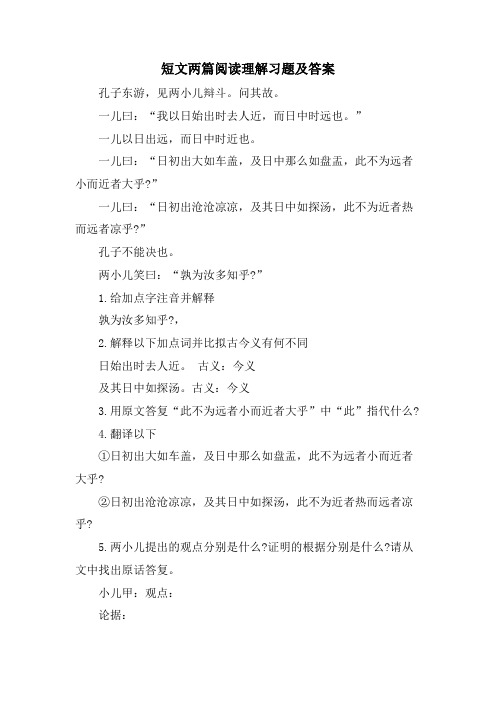
短文两篇阅读理解习题及答案孔子东游,见两小儿辩斗。
问其故。
一儿曰:“我以日始出时去人近,而日中时远也。
”一儿以日出远,而日中时近也。
一儿曰:“日初出大如车盖,及日中那么如盘盂,此不为远者小而近者大乎?”一儿曰:“日初出沧沧凉凉,及其日中如探汤,此不为近者热而远者凉乎?”孔子不能决也。
两小儿笑曰:“孰为汝多知乎?”1.给加点字注音并解释孰为汝多知乎?,2.解释以下加点词并比拟古今义有何不同日始出时去人近。
古义:今义及其日中如探汤。
古义:今义3.用原文答复“此不为远者小而近者大乎”中“此”指代什么?4.翻译以下①日初出大如车盖,及日中那么如盘盂,此不为远者小而近者大乎?②日初出沧沧凉凉,及其日中如探汤,此不为近者热而远者凉乎?5.两小儿提出的观点分别是什么?证明的根据分别是什么?请从文中找出原话答复。
小儿甲:观点:论据:小儿乙:观点:论据:6.这个写得生动,形象而又寓意深刻。
请你根据自己的理解,任选一个角度,用三言两语加以评说。
7.对“两小儿笑曰”一句中“笑”的理解,有人认为这是“善意的笑”;有人那么认为这是“恶意的嘲笑,嘲笑”。
你同意哪一态度?谈谈你的理由。
【参考答案】1.zhì “知”通“智”,聪明。
2.间隔;到某地方。
热水;食物煮后所得的汁水。
3.日初出大如车盖,及日中那么如盘盂。
4.略。
5.小儿甲:日始出时去人近,而日中时远也。
日初出大如车盖,及日中那么如盘盂。
小儿乙:以日初出远,而日中时近也。
日初出沧沧凉凉,及其日中如探汤。
6.略。
7.言之有理即可。
爱莲说文言文翻译及阅读答案
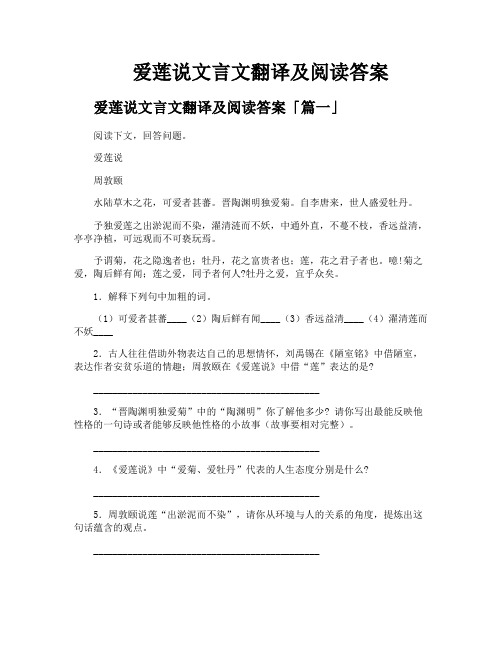
爱莲说文言文翻译及阅读答案爱莲说文言文翻译及阅读答案「篇一」阅读下文,回答问题。
爱莲说周敦颐水陆草木之花,可爱者甚蕃。
晋陶渊明独爱菊。
自李唐来,世人盛爱牡丹。
予独爱莲之出淤泥而不染,濯清涟而不妖,中通外直,不蔓不枝,香远益清,亭亭净植,可远观而不可亵玩焉。
予谓菊,花之隐逸者也;牡丹,花之富贵者也;莲,花之君子者也。
噫!菊之爱,陶后鲜有闻;莲之爱,同予者何人?牡丹之爱,宜乎众矣。
1.解释下列句中加粗的词。
(1)可爱者甚蕃____(2)陶后鲜有闻____(3)香远益清____(4)濯清莲而不妖____2.古人往往借助外物表达自己的思想情怀,刘禹锡在《陋室铭》中借陋室,表达作者安贫乐道的情趣;周敦颐在《爱莲说》中借“莲”表达的是?______________________________________________3.“晋陶渊明独爱菊”中的“陶渊明”你了解他多少? 请你写出最能反映他性格的一句诗或者能够反映他性格的小故事(故事要相对完整)。
______________________________________________4.《爱莲说》中“爱菊、爱牡丹”代表的人生态度分别是什么?______________________________________________5.周敦颐说莲“出淤泥而不染”,请你从环境与人的关系的角度,提炼出这句话蕴含的观点。
______________________________________________6.作者钟情于莲花,并以莲自况来表白他的生活态度。
请你以“莲,不求富贵乃花中君子”,写出下句使之成为一组对偶句。
上句:莲,不求富贵乃花中君子下句:松,_____________是树中勇士参考答案:1.①多②少③更加④美丽而不庄重2.对君子不同流合污、庄重、质朴、正直品质的赞美和追求3.示例:少无适俗韵,性本爱丘山为五斗米折腰的故事。
4.爱菊:代表的人生态度是隐居避世爱牡丹:代表的人生态度是追求功名利禄。
2024人教版语文八年级上册第三单元阅读翻译(可打印)

10三峡自三峡七百里中,两岸连山,略无阙处。
重岩叠嶂,隐天蔽日,自非亭午夜分,不见曦月。
在七百里三峡当中,两岸都是连绵的高山,一点也没有中断的地方。
层层的悬崖,排排的峭壁,把天空和太阳都遮蔽了。
如果不是在正午,就看不到太阳;不是在半夜,就看不到月亮。
至于夏水襄陵,沿溯阻绝。
或王命急宣,有时朝发白帝,暮到江陵,其间千二百里,虽乘奔御风,不以疾也。
到夏天江水漫上山陵的时候,下行和上行的航道都被阻断,不能通航。
倘若碰到皇帝的命令要急速传达,有时候清早(坐船)从白帝城出发,傍晚便可到达江陵。
中间相距一千二百里,即使骑着骏马,驾着疾风,也没有这么快。
春冬之时,则素湍绿潭,回清倒影。
绝 多生怪柏,悬泉瀑布,飞漱其间,清荣峻茂,良多趣味。
在春、冬两个季节,白色的急流中有回旋的清波,绿色的潭水中有倒映着的各种景物的影子。
极高的山峰上多生长着奇形怪状的柏树,悬泉瀑布在山峰之间飞速冲荡。
水清,树荣,山高,草盛,有很多趣。
每至晴初霜旦,林寒涧肃,常有高猿长啸,属引凄异,空谷传响,哀转久绝。
故渔者歌曰:“巴东三峡巫峡长,猿鸣三声泪沾裳。
”(在秋天)每到天刚放睛的时候或下霜的早晨,树林和山涧之中一片清寒肃杀。
高处的猿猴拉长声音啼叫,声音连续不断,凄惨悲凉。
空旷的山谷中传来猿啼的回声,悲凉婉转,很久很久才消失。
所以渔民们唱道:“巴东三峡巫峡长,猿鸣三声泪沾裳!”11短文两篇山川之美,古来共谈。
高峰入云,清流见底。
两岸石壁,五色交辉②。
青林翠竹,四时俱备。
晓雾将歇®,猿鸟乱鸣;夕日欲颓®,沉鳞®竞跃。
实是欲界之仙都®。
自康乐®以来,未复有能与其奇者。
山川景色的美丽,自古以来就是文人雅士共同谈论的。
巍峨的山峰耸入云端,明净的溪流清澈见底。
两岸的石壁五彩斑斓,交相辉映。
青葱的林木,翠绿的竹丛,四季都有。
清晨的薄雾将要消散,猿、鸟此起彼伏地鸣叫着;夕阳快要落山了,潜游在水中的鱼儿争相跃出水面。
汉英段落翻译分析解析
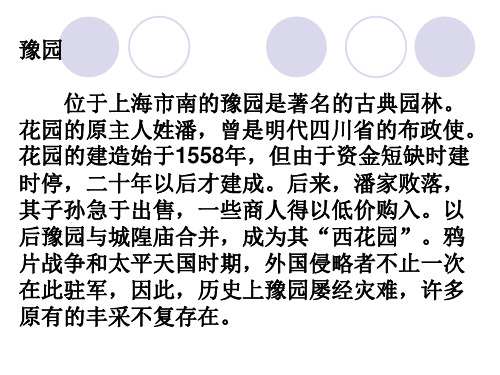
(1) The Yu Yuan Garden in the south of Shanghai is a famous classical garden. It was originally the private garden of a man named Pan, who was once the governor of Sichuan Province during the Ming Dynasty. (2) The construction of the garden started in 1858, but it was not completed until twenty years later (because it went on and off) for lack of money.
解放以后,在人民政府的关怀下,豫园经历了多次修复。 最近一次在1987年,恢复了其东西部分 。 Under the care of the people’s government since liberation, Yu Yuan Garden has gone through many renovations, with the recent one carried out in 1987 to restore its eastern part. Since 1949, under the care of …, Yu Yuan Garden has gone through many renovations, the most recent of which was done in 1987 when its eastern part and western part were restored.
解放以后,在人民政府的关怀下,豫园经 历了多次修复。最近一次在1987年,恢复了 其东西部分 。豫园在1982年被列为国务院重 点保护单位,是中国南方最优秀的园林之一。 园内有亭台楼阁,有池塘和假山,景点超过 40个,每天至少有一万人在园内游览。难怪 人们说:“到上海不去豫园和城隍庙商场不 算来过大上海。”
八年级上第10课《短文两篇》中考复习题及答案【统编版】

八年级上第10课《短文两篇》中考综合复习题及答案【部编版】班级:姓名:说明:根据习题难易度,分A卷和B卷,B卷选择题涉及全六册古文知识点。
一、A卷:夯实基础类题型:【重点注释默写】【重点句子翻译】【课内简答题】二、B卷:能力提升类题型:【理解性默写】【文言现象:通假字、古今异义、词类活用、一词多义、文言句式】【选择题】【课外文言文阅读】目录:一、《答谢中书书》二、《记承天寺夜游》一、《答谢中书书》中考综合复习题A卷:夯实基础一、重点注释默写:1、【五色交辉】2、【四时】3、【歇】4、【夕日欲颓】【颓】,5、【沉鳞】6、【欲界之仙都】7、【与】二、重点句子翻译:1、山川之美,古来共谈。
翻译:2、青林翠竹,四时俱备。
翻译:3、晓雾将歇,猿鸟乱鸣;夕日欲颓,沉鳞竞跃,实是欲界之仙都。
翻译:4、自康乐以来,未复有能与其奇者。
三、课内简答题:1、本文第一句话“山川之美,古来共谈”在全文结构上起什么作用?2、全文抓住哪一个字来写?描写了哪些景物?这些景物在描写上有哪些特点?3、找出文中的议论句,并说说起作用(本文表达了作者怎样的思想感情?)。
四、理解性默写:1、文中从侧面表现江水清澈的句子是:2、文中与“有时朝发白帝,暮到江陵,其间千二百里,虽乘奔御风,不以疾也”有异曲同工之妙的(比喻、夸张)句子是:3、文中赋予静止的山以奋发向上的无穷生命力的四句是:4、表达作者对富春江奇山异水的赞美、留恋以及鄙弃功名、淡泊名利的思想感情的句子是:五、文言知识积累:1、分析加点字的文言现象,并解析:①四时.俱备:②四时俱备.:③晓雾将歇.:④晓.雾将歇:⑤夕日欲颓.:⑥古来共谈.:⑦五色交辉.:2、一词多义:欲:①夕日欲颓:②实是欲界之仙都:自:①自康乐以来:②自非亭午夜分:与:①未复有能与其奇者:②念无与为乐者:书:①谢答中书书:②谢答中书书:六、选择题:1、下列加点词语意思相同的一组是( )A、未复有能与.其奇者/念无与.为乐者B、沉鳞.竞跃/沙鸥翔集,锦鳞.游泳C、泠泠作.响/困于心衡于虑而后作.D、有时见.日/风吹草低见.牛羊2、词的用法、意思相同的一组是:()A.之:山川之美/甚矣,汝之不惠B.是:实是欲界之仙都/问今是何世C.与:念无与为乐者/未复有能与其奇者D.寻:寻张怀民/寻病终3、下列加点词语意思相同的一组是( )A、四时俱备. /急应河阳役,犹得备.晨炊B、沉鳞.竞跃/沙鸥翔集,锦鳞.游泳C、泠泠作.响/困于心衡于虑而后作.D、有时见.日/胡不见.我于王4、下列各组句子中加点词的意义相同的一项是()A. ①实是.欲界之仙都。
文言文阅读答案解析及翻译 文言文原文阅读答案翻译注释【优秀2篇】

文言文阅读答案解析及翻译文言文原文阅读答案翻译注释【优秀2篇】(经典版)编制人:__________________审核人:__________________审批人:__________________编制单位:__________________编制时间:____年____月____日序言下载提示:该文档是本店铺精心编制而成的,希望大家下载后,能够帮助大家解决实际问题。
文档下载后可定制修改,请根据实际需要进行调整和使用,谢谢!并且,本店铺为大家提供各种类型的经典范文,如总结报告、合同协议、规章制度、条据文书、策划方案、心得体会、演讲致辞、教学资料、作文大全、其他范文等等,想了解不同范文格式和写法,敬请关注!Download tips: This document is carefully compiled by this editor. I hope that after you download it, it can help you solve practical problems. The document can be customized and modified after downloading, please adjust and use it according to actual needs, thank you!Moreover, our store provides various types of classic sample essays, such as summary reports, contract agreements, rules and regulations, doctrinal documents, planning plans, insights, speeches, teaching materials, complete essays, and other sample essays. If you want to learn about different sample formats and writing methods, please pay attention!文言文阅读答案解析及翻译文言文原文阅读答案翻译注释【优秀2篇】精选文言文阅读答案解析及翻译篇一近日,温州十四中的美·女老师王媚媚一封文言文辞职信,惊呆了温十四中全体师生,也惊呆各路网友大神。
部编版八年级下全册古文重点句子翻译习题带答案
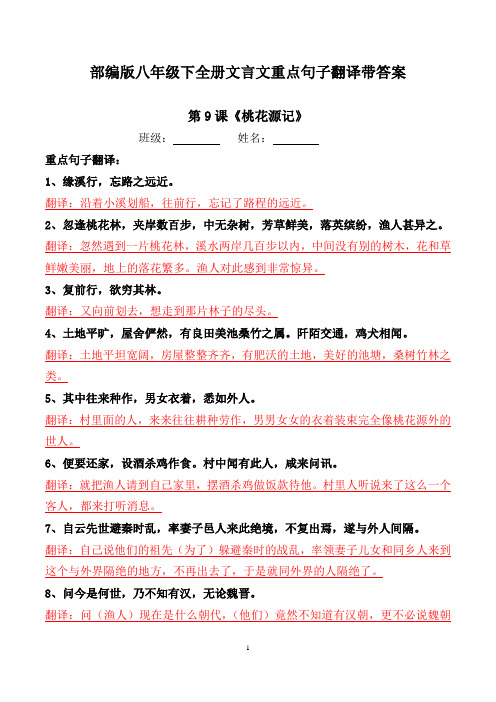
部编版八年级下全册文言文重点句子翻译带答案第9课《桃花源记》班级:姓名:重点句子翻译:1、缘溪行,忘路之远近。
翻译:沿着小溪划船,往前行,忘记了路程的远近。
2、忽逢桃花林,夹岸数百步,中无杂树,芳草鲜美,落英缤纷,渔人甚异之。
翻译:忽然遇到一片桃花林,溪水两岸几百步以内,中间没有别的树木,花和草鲜嫩美丽,地上的落花繁多。
渔人对此感到非常惊异。
3、复前行,欲穷其林。
翻译:又向前划去,想走到那片林子的尽头。
4、土地平旷,屋舍俨然,有良田美池桑竹之属。
阡陌交通,鸡犬相闻。
翻译:土地平坦宽阔,房屋整整齐齐,有肥沃的土地,美好的池塘,桑树竹林之类。
5、其中往来种作,男女衣着,悉如外人。
翻译:村里面的人,来来往往耕种劳作,男男女女的衣着装束完全像桃花源外的世人。
6、便要还家,设酒杀鸡作食。
村中闻有此人,咸来问讯。
翻译:就把渔人请到自己家里,摆酒杀鸡做饭款待他。
村里人听说来了这么一个客人,都来打听消息。
7、自云先世避秦时乱,率妻子邑人来此绝境,不复出焉,遂与外人间隔。
翻译:自己说他们的祖先(为了)躲避秦时的战乱,率领妻子儿女和同乡人来到这个与外界隔绝的地方,不再出去了,于是就同外界的人隔绝了。
8、问今是何世,乃不知有汉,无论魏晋。
翻译:问(渔人)现在是什么朝代,(他们)竟然不知道有汉朝,更不必说魏朝和晋朝了。
9、不足为外人道也。
翻译:不值得对外界的人说啊!10、既出,得其船,便扶向路,处处志之。
翻译:出来后,找到了他的船,就沿着先前的路回去,(一路上)处处标上记号。
(二)第10课《小石潭记》班级:姓名:重点句子翻译:1、从小丘西行百二十步,隔篁竹,闻水声,如鸣佩环,心乐之。
翻译:从小丘向西走一百二十多步,隔着竹林,可以听到水声,就像人身上佩带的佩环相碰击发出的声音,(我)心里感到高兴。
2、全石以为底,近岸,卷石底以出,为坻,为屿,为嵁,为岩。
翻译:小潭以整块石头为底,靠近岸边,石底有些部分翻卷过来露出水面,成为了水中高地、小岛、不平的岩石和石岩等各种不同的形状。
汉译英段落翻译6则之参考答案

汉译英段落翻译6则之参考答案段落1参考译文:Chinese people has never thought of human being as the highest creature among everything since ancient times, whose reflection takes a quite appropriate proportion with all others in our natural world in both aspects of philosophy and arts, but not as an absolute dominant ruler. Therefore, our bitterness and depression are basically less than those of westerners, because the intensity of which is growing with the expansion of one's desire and ambition. People in the agriculture society enjoyed far less than people in the industry society, thus their wants are far less either. Besides, ancient Chinese always regard "not confined by material, not driven by material" as the major philosophy.段落2参考译文:Beside this picture with profusions of colors, a group of sheep are lowing their heads, eating by the river bank. Hardly none of them would spare some time to raise their eyes to have a glance at the beautiful dusk. They are, perhaps, taking use of every minute to enjoy their last chew before being driven home. This is a picture of the Yellow River bank, in which the shepherd disappears, and no one knows where he is resting himself. Only the sheep, however, as free creatures, are joyfully appreciating the dusk. The exuberant water plants have nutrited the sheep, making them grow as fat as balls. When approaching near, you would find their lily-white teeth and a variety of innocent facial impressions.段落3参考译文:I think everyone, in effect, has a small garden or a flower bed of his own, namely, our inner world. There is a need for humanbeings to tap into their own intelligence, as is the case with their inner world. What distinguishes between human beings and animals, apart from the various aspects which are universally known, may probably be in that human beings have an inner world. Heart is no more than an important organ whereas the inner world constitutes a landscape, which gradually takes its shape under the continuous influence from the outside world. So great is the importance that everyone attaches to the physical condition of his own heart or those of his closest and dearest ones, that merely a minor disease would enduringly weign on his mind.段落4参考译文:Cell phone has altered human relations. There is usually a note on the door of conference room, which reads "close your handset|." However, the rings are still resounding in the room. We are all common people and has few urgencies to do. Still, we are reluctant to turn off the phone. Cell phone symbolizes our connection with the world and reflects our "thirst for socialization." We are familiar with the scene when a person stops his steps to edit short messages with eyes glued at his phone, disregard of his location, whether in road center or beside restroom.段落5参考译文:Friends tend to become more intimated if they have the same interests and temper, they can get along well and keep contacting; otherwise they will separate and end the relationship. Friends who are more familiar and closer can not be too casual and show no respect. Otherwise the harmony and balance will be broken, and the friendship will also be nonexistent any more. Everyone hopes to have his own private space, and if too casualamong friends, it is easy to invade this piece of restricted areas, which will lead to the conflict, resulting in alienation. It may be a small matter to be rude to friends; however, it is likely to plant the devastating seeds. The best way to keep the close relationship between friends is to keep contacts with restraint, and do not bothereach other.段落6参考译文:Life is like a glass of wine; people who love it discover inexhaustible wonders from it. Hold in the hand and gaze at it, the dark red color is reminiscent of the blood, which is the impress of life. Take a sip of it and appreciate the taste, the bittersweet flavor is exactly the same with life, which is complicated and blurred. Once the sip is swallowed, the lingering fragrance pleases the heart and refreshes the mind, leaving a person lifelong benefit. There is a remarkable resemblance between life and wine: the taste becomes more delicious as the wine mellows, just as life gets better as it becomes more abundant. When life comes to twilight years, it looks calm and tastes full of wisdom and generosity, just like a bottle of wine to be savored.。
《短文二篇》阅读练习(解析版)

比较阅读2《短文二篇》(一)阅读下面的文段,回答后面的问题。
答谢中书书山川之美,古来共谈。
高峰入云,清流见底。
两岸石壁,五色交辉。
青林翠竹;四时俱备。
晓雾将歇,猿鸟乱呜;夕日欲颓,沉鳞竞跃。
实是欲界之仙都。
自康乐以来,未复有能与其奇者。
1.解释下面句子中加点字词在文中的意思。
(1)四时..俱备(2)晓雾将歇.(3)夕日欲颓.(4)与.其奇者【答案】(1)四季。
(2)休息。
这里指消散。
(3)坠落。
(4)参与,这里指欣赏。
【解析】(1)句意为:四季都有。
“四时”,四季。
(2)句意为:清晨的薄雾将要消散。
(3)句意为:夕阳快要落山了。
“颓”:坠落。
(4)欣赏这种奇利景色的人了。
“与”,欣赏,领悟。
2.把下面的文字翻泽成现代汉语。
(1)两岸石壁,五色交辉(2)夕日欲颓,沉鳞竞跃【答案】(1)两岸的石壁五彩斑斓,交相辉映。
(2)夕阳快要落山了,潜游水中的鱼竞相跳出水面。
【解析】(1)句关键词:“五色交辉”,这里形容石壁色彩斑斓,交相辉映。
(2)句关键词:“颓”,坠落。
“沉鳞”,指水中潜游的鱼。
3.讲究色彩搭配,表现一年之美,呈现出一派绚烂辉煌的气象景象的对偶句是,将听觉、视觉结合,由静入动,表现一日之美,传达了生命气息的对偶句。
【答案】两岸石壁,五色交辉。
青林翠竹,四时具备。
晓雾将歇,猿鸟乱鸣;夕日欲颓,沉鳞竞跃。
【解析】第一空填写“两岸石壁,五色交辉。
青林翠竹,四时具备。
”句子中的“五色交辉”“青林翠竹”都体现了色彩。
第二空应填写“晓雾将歇,猿鸟乱鸣;夕日欲颓,沉鳞竞跃。
”“晓雾将歇”“夕日欲颓,沉鳞竞跃”视觉;“猿鸟乱鸣”听觉;由早到晚,由静入动。
4.最能体现作者思想感情的语句是哪句话?表达了作者怎样的思想感情?【答案】实是欲界之仙都,自康乐以来,未复有能与其奇者。
表达了作者沉醉山水的愉悦之情和与古今知音共赏美景的得意之感。
与谢公比肩之意溢于言表。
【解析】考查文章主旨句,通过主旨句理解作者的情感。
“实是欲界之仙都”,将此地山水比作人间天堂,应是最大的褒奖和赞美!“自康乐以来,未复有能与其奇者”,但遗憾的是,自从谢灵运以来,没有人能够欣赏它的妙处。
17短文两篇翻译文言句子-(群文阅读)2021-2022学年七年级下册阅读考点精练(原卷版)

17、《短文两篇》——群文阅读学习文言文的必备技能——翻译文言句子课文中有很多经典的句子,在中考中常以翻译句子的形式被考查,如“斯是陋室,惟吾德馨”“予独爱莲之出淤泥而不染”等。
学习时应准确翻译这些句子。
【考点解读】翻译文言句子,几乎是中考文言文阅读的必考内容。
常见的考查方式有:①文中有深层意义、表现力强、反映主旨的句子;②判断句、省略句、倒装句、被动句等句式较特殊的句子;③有古今异义、通假字、词类活用等特殊现象的句子。
考查形式主要是:把下面的句子翻译为现代汉语(或:用现代汉语翻译下面的句子)。
【技法点拨】文言句子的翻译通常有两种方法:直译和意译。
所谓“直译”,就是将原文逐字逐句落实到译文中去,尽量译出原文用词造句的特点,甚至在表达方式上也要求与原文尽可能保持一致。
所谓“意译”,就是根据原文表达的基本意思来进行翻译,不拘泥于字字句句的落实,甚至可以采用与原文差别较大的表达方式。
一般情况下都采用直译的方式,只有在确实难以直译的情况下才酌情采用意译。
文言文翻译要符合“信、达、雅”的标准:“信”,即字字落实,力求准确;“达”,即文从句顺,力求通顺;“雅”,即生动形象,讲究文采。
翻译文言句子的具体方法如下:1.对。
就是对译,逐字对照翻译。
2.换。
就是用现代词语替换古代词语。
将单音节词换成双音节词,通假字换成通假后的字,词类活用词换成活用后的词。
如“山不在高,有仙则名”,“名”在这里是名词用作动词,翻译为“出名,有名”。
3.留。
即保留,凡是国号、庙号、年号、人名、地名、官名等专有名词或现代汉语也通用的词,皆可保留,不必翻译。
如“南阳诸葛庐”中的地名“南阳”,“晋陶渊明独爱菊”中的人名“陶渊明”,等等。
4.删。
指删除,有些文言虚词在句中只起语法作用,并没有实际意义,只要不影响语气,就可以删去。
如“莲之出淤泥而不染”,“之”用在主语和谓语之间,取消句子的独立性,无实义,不译。
5.补。
指增补,就是把文言文中省略的成分补上。
2024年新高一语文初升高衔接《文言文断句及翻译》含答案解析

第11讲 文言文基础知识文言文断句及翻译初高中衔接基础冲关练1.掌握断句、翻译的基本方法,正确断句及翻译文言句子。
2.突破做题过程中的难点,做到精准断句,准确翻译文言语句。
文言文断句中国古代没有标点符号,古人读书都要自己断句,在一句话的末了用小圆圈(“。
”)断开,叫“句”;在一句之内语气停顿的地方用顿号(“、”)断开,叫“读”。
断句是考查文言文的传统方式,是学生学习文言文的基本功。
1.凭语感,先断易首先默读一至两遍,大体了解文段,凭语感将能断开的先断开,逐步缩小范围,然后集中精力分析难断处,先易后难。
【例1】诸葛亮之次渭滨关中震动魏明帝深惧晋宣王战乃遣辛毗为军司马。
(《世说新语》) 解析:句中共有四个人物“诸葛亮”“魏明帝”“晋宣王”“辛毗”,两个地名“渭滨”“关中”,一个官名“军司马”;句中动词有“次”“震动”“惧”“战”“遣”“为”等;然后以动词为中心,弄清人物间的关系,了解事件的经过。
答案:诸葛亮之次渭滨/关中震动/魏明帝深惧晋宣王战/乃遣辛毗为军司马。
2.“云”“曰”“道”,明对话 在文言文中,可借助“曰”“云”“言”“谓”“道”等动词来判断人物的对话,进行断句。
【例2】樊哙曰今日之事何如良曰甚急今者项庄拔剑舞其意常在沛公也哙曰此迫矣臣请入与之同命。
(《鸿门宴》) 解析:文段中有三个“曰”字,是人物的说话提示,此处必然要断开。
答案:樊哙曰/今日之事何如/良曰/甚急/今者项庄拔剑舞/其意常在沛公也/哙曰/此迫矣/臣请入/与之同命。
3.借虚词,明停顿 如“盖”“夫”“其”等发语词常放在句首,“耳”“乎”“哉”“焉”“也”“耶”等语气词常放在句尾,“之”“以”“则”“而”等助词、介词、连词常放在句中。
衔接点二古诗文阅读|非常完美| 【例3】齐王使使者问赵威后书未发威后问使者曰岁亦无恙耶民亦无恙耶王亦无恙耶使者不说曰臣奉使使威后今不问王而先问岁与民岂先贱而后尊贵者乎?(《战国策·齐策四》) 解析:从句意看,这段文字是使者与赵威后的对话。
《论语》片段阅读答案及译文

《论语》片段阅读答案及译文《论语》片段阅读答案及译文1阅读下面《论语》片段,按要求回答下列问题。
子贡曰:“贫而无谄,富而无骄,何如?”子曰:“可也。
未若贫而乐,富而好礼者也。
”子贡曰:“《诗》云,‘如切如磋,如琢如磨’,其斯之谓与?”子曰:“赐也!始可与言《诗》已矣,告诸往而知来者。
”?(1)子贡引用“如切如磋,如琢如磨”是为了说明什么道理?(2)为什么孔子认为可以同子贡谈论《诗》?【答案】(1)说明道德品德的修炼需要像雕琢玉器一样,精益求精。
(2)由于在对话中孔子认为,子贡已经具备了“告诸往而知来者”的力量,即举一反三的.力量。
【解析】【详解】(1)试题分析:此题主要考察归纳内容要点,概括中心愿思及分析概括在文中的观点态度的力量。
子贡引用“如切如磋,如琢如磨”是为了说明什么道理,联系上下文内容理解。
子贡受到教师的启发,认为就像《诗经》所说的,完善人格要像玉石器物的磨制一样,精雕细刻,精益求精。
(2)试题分析:此题主要考察归纳内容要点,概括中心愿思及分析概括在文中的观点态度的力量。
孔子认为可以同子贡谈论《诗》的缘由,结合后面内容“告诸往而知来者”分析可知,子贡能够举一反三了。
【点睛】无论何种句子,都不能脱离语境去理解。
理解中国古典文化经典的文章都有肯定的难度,考生平常必需多阅读,了解诸子百家的思想,了解经典名著的思想,这样积少成多,有助于理解文段内容。
此题也意在引导学生多读经典。
参考译文:子贡说:“贫困而能不谄媚,富有而能不傲慢自大,怎么样?”孔子说:“这也算可以了。
但是不如贫困而仍欢乐,富有而又好礼的人。
”子贡说:“《诗经》上说:‘如切如磋,如琢如磨。
’讲的就是这个意思吧?”孔子说:“子贡呀,我现在可以同你谈论《诗》了,由于告知你这一点,你就可以知道另一点。
”《论语》片段阅读答案及译文2阅读下面《论语》《孟子》选段,回答下列问题。
(6分)①子曰:躬自厚而薄责于人,则远怨矣!(《论语·卫灵公》)②子曰:伯夷、叔齐不念旧恶,怨是用希①。
高考语文复习之文言文语段翻译练答案
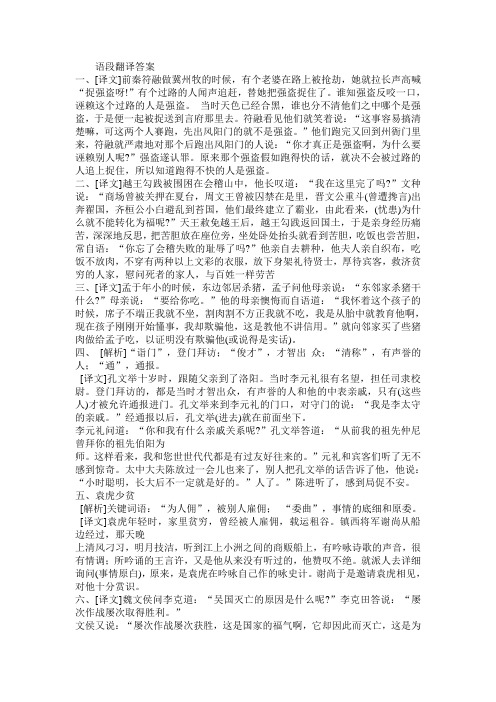
语段翻译答案一、[译文]前秦符融做冀州牧的时候,有个老婆在路上被抢劫,她就拉长声高喊“捉强盗呀!”有个过路的人闻声追赶,替她把强盗捉住了。
谁知强盗反咬一口,诬赖这个过路的人是强盗。
当时天色已经合黑,谁也分不清他们之中哪个是强盗,于是便一起被捉送到言府那里去。
符融看见他们就笑着说:“这事容易搞清楚嘛,可这两个人赛跑,先出风阳门的就不是强盗。
”他们跑完又回到州衙门里来,符融就严肃地对那个后跑出风阳门的人说:“你才真正是强盗啊,为什么要诬赖别人呢?”强盗遂认罪。
原来那个强盗假如跑得快的话,就决不会被过路的人追上捉住,所以知道跑得不快的人是强盗。
二、[译文]越王勾践被围困在会稽山中,他长叹道:“我在这里完了吗?”文种说:“商场曾被关押在夏台,周文王曾被囚禁在是里,晋文公重斗(曾遭搀言)出奔翟国,齐桓公小白避乱到苔国,他们最终建立了霸业,由此看来,(忧患)为什么就不能转化为福呢?”天王赦免越王后,越王勾践返回国土,于是亲身经历痛苦,深深地反思,把苦胆放在座位旁,坐处卧处抬头就看到苦胆,吃饭也尝苦胆,常自语:“你忘了会稽失败的耻辱了吗?”他亲自去耕种,他夫人亲自织布,吃饭不放肉,不穿有两种以上文彩的衣服,放下身架礼待贤士,厚待宾客,救济贫穷的人家,慰问死者的家人,与百姓一样劳苦三、[译文]孟于年小的时候,东边邻居杀猪,孟子问他母亲说:“东邻家杀猪干什么?”母亲说:“要给你吃。
”他的母亲懊悔而自语道:“我怀着这个孩子的时候,席子不端正我就不坐,割肉割不方正我就不吃,我是从胎中就教育他啊,现在孩子刚刚开始懂事,我却欺骗他,这是教他不讲信用。
”就向邻家买了些猪肉做给孟子吃,以证明没有欺骗他(或说得是实话)。
四、[解析]“诣门”,登门拜访;“俊才”,才智出众;“清称”,有声誉的人;“通”,通报。
[译文]孔文举十岁时,跟随父亲到了洛阳。
当时李元礼很有名望,担任司隶校尉。
登门拜访的,都是当时才智出众,有声誉的人和他的中表亲戚,只有(这些人)才被允许通报进门。
文言文双文本阅读:观其所短,以知其长(附答案解析与译文)

想去哪座城市英语作文(中英文实用版)Title: A City I Dream to VisitThere exists a captivating city in my heart, a place where I yearn to wander and immerse myself in its unique charm.New York City, with its bustling streets and iconic landmarks, has always been the destination I long to explore.The vibrant energy that pulsates through this concrete jungle is like a siren call to my wanderlust spirit.心中有一座令人着迷的城市,那是我渴望漫步其中,沉醉于其独特魅力的地方。
纽约,以其熙熙攘攘的街道和标志性的地标,一直是我渴望探索的目的地。
这座混凝土丛林中涌动的生机活力,如同对我的旅行欲望发出的诱人呼唤。
From the towering skyscrapers that reach for the sky to the diverse and vibrant culture that thrives in every corner, New York City is a symphony of contrasts and possibilities.I imagine myself strolling through Central Park, feeling the gentle breeze caressing my face, as the city"s rhythmical heartbeat echoes all around.从直插云霄的摩天大楼,到每个角落里繁荣多样的文化,纽约是一座充满对比和可能性的交响乐。
《短文二篇》课后习题参考答案
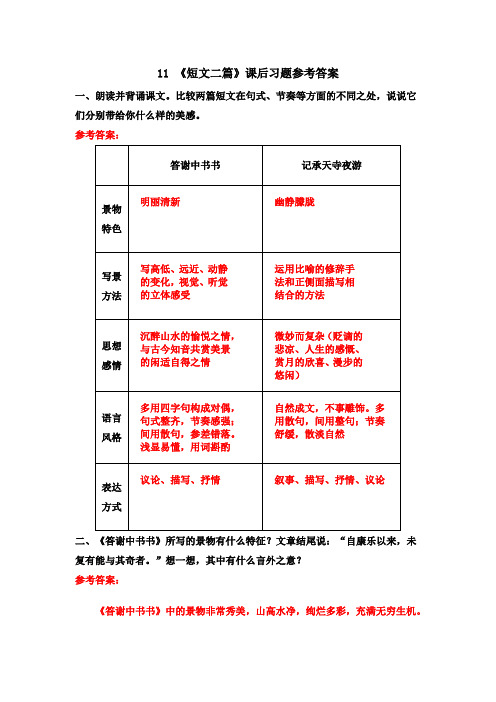
11 《短文二篇》课后习题参考答案一、朗读并背诵课文。
比较两篇短文在句式、节奏等方面的不同之处,说说它们分别带给你什么样的美感。
参考答案:二、《答谢中书书》所写的景物有什么特征?文章结尾说:“自康乐以来,未复有能与其奇者。
”想一想,其中有什么言外之意?参考答案:《答谢中书书》中的景物非常秀美,山高水净,绚烂多彩,充满无穷生机。
结尾一句,含有三层言外之意:其一,康乐是“能与其奇者”,表现出作者对谢灵运的钦慕;其二,自谢灵运之后,不再有人能“与其奇”,惋惜于世人对秀美山水的无动于衷;其三,“我”是继谢灵运之后又一“与其奇者”,为自己的审美情趣而自许,期与谢公比肩之意溢于言表。
三、细读《记承天寺夜游》,体会作者的心境。
结合写作背景和你对苏轼生平、思想的认识,谈谈对“闲人”的理解。
参考答案:《记承天寺夜游》中,“我”的心境是微妙而复杂的,贬谪的悲凉,人生的感慨,赏月的欣喜,漫步的悠闲,都包含其中。
“闲人”既指二人的政治处境,即作为贬谪之人,无职无权,清闲无比,内心悲凉无可诉说;又指夜游时的心境,即空灵自在,悠游自如,故能欣赏到一派空明的景象。
既含有自嘲、自慰之意——不能修齐治平,只好夤(yín)夜闲游赏月;又颇有自许的意味——此等美景,如果不是我们两个富有雅趣之人欣赏,岂不浪费?这又表现出一种达观的生活态度。
苏轼的思想兼受儒、道、佛三家的影响,所以往往能在逆境中自解自适,将人生的挫折化为审美的机缘。
四、解释下列加点词的含义,并体会其妙处。
,古来共.谈两岸石壁,五色交.辉青林翠竹,四时俱.备入.云,清流见.底晓雾将.歇,猿鸟乱.鸣夕日欲.颓,沉鳞竞.跃参考答案::共同。
“共”与“未复”,前后呼应,形成对比。
既彰显古人的雅量深致,也感叹今人的粗陋无文,隐含自矜自得之意。
交:交相。
岩壁五彩斑斓,着一“交”字,则有目眩神迷之意。
俱:都。
竹树青翠欲滴,用一“俱”字,则现终年常绿之色。
:耸入。
见:看见。
“入”极写山之高。
翻译句子阅读及答案

翻译句子阅读及答案。
【小题1】山不在高,有仙则名。
【小题2】谈笑有鸿儒,往来无白丁。
【小题3】无丝竹之乱耳,无案牍之劳形。
【小题4】何陋之有?【小题5】斯是陋室,惟吾德馨。
【小题6】苔痕上阶绿,草色入帘青。
答案【小题1】山不在于高低,有仙人就出名。
【小题2】与我谈笑的都是博学的人,与我交往的没有知识浅薄的人。
【小题3】没有嘈杂的音乐扰乱双耳,没有官府公文使身体劳累。
【小题4】(既然君子住在里面),又有什么简陋的呢?【小题5】这是间简陋的屋子,只是我的品德高尚。
【小题6】苔藓的痕迹碧绿,长到台阶上,青葱的小草映入竹帘里。
解析【小题1】试题分析:翻译句子,应注意“字字落实,直译为主,意译为辅”。
在考试时,判分的规则便是,看重点字词的意思有没有译出;没有译出,便要扣分。
“山不在高,有仙则名”中,“名”是重点字词,出名的意思。
考点:此题是对语句的翻译能力的考查。
点评:直译,指译文要与原文保持对应关系,重要的词语要相应的落实,要尽力保持原文遣词造句的特点和相近的表达方式,力求语言风格也和原文一致。
文言文直译的原则:信、达、雅。
“信”是忠实于原文的内容和每个句子的含义。
“达”就是翻译出的现代文表意要明确,语言要通畅。
“雅”就是用简明、优美、富有文采的现代汉语把原文的内容、形式以及风格准确表达出来。
【小题2】试题分析:翻译句子,应注意“字字落实,直译为主,意译为辅”。
在考试时,判分的规则便是,看重点字词的意思有没有译出;没有译出,便要扣分。
“谈笑有鸿儒,往来无白丁”中,“鸿儒”、“白丁”是重点字词。
这些重点字词需要落实到位。
考点:此题是对语句的翻译能力的考查。
点评:直译,指译文要与原文保持对应关系,重要的词语要相应的落实,要尽力保持原文遣词造句的特点和相近的表达方式,力求语言风格也和原文一致。
文言文直译的原则:信、达、雅。
“信”是忠实于原文的内容和每个句子的含义。
“达”就是翻译出的现代文表意要明确,语言要通畅。
重点句子翻译答案

必修五文言重点句子翻译答案《陈情表》1、祖母刘氏可怜我孤单弱小,亲自抚养。
2、既没有叔叔伯伯,也没有哥哥弟弟;门庭衰微福分又浅,很晚才得到儿子。
3、我想手捧诏书上京赴职,只因刘氏的病日重一日,想姑且迁就私情,但是报告申诉又得不到准许。
4、只因为祖母刘氏已像接近西山的落日,只剩一缕将断的气息,生命十分危险,已经处于朝不保夕的境地。
5、祈望陛下能体恤我愚拙至诚之心,满足我微不足道的心愿,或许祖母刘氏能因此侥幸,最终得以安度余年。
6、我怀着像犬马一样不胜恐惧的心情,谨此上表禀告。
《项脊轩志》1、我们家读书人很久没有奏效(取得功名)了,这个读书成功,是可以期待的了!2、那以后又过了两年,我因久卧病榻,心里无所寄托,于是叫人重新整修南阁子,它的格局与以前稍有不同。
3、庭院中有一棵枇杷树,是我妻子在她去世那一年亲手栽种的,现在已长得高大挺拔,枝叶繁茂像伞盖一样了。
《报任安书》4、人之常情都是爱惜生命、厌恶死亡,顾念父母妻儿的,至于被道义激发的人就不是这样了,是因为他们有不得已的地方啊。
(“不得已”也可译成“没有完成的事”)5、我忍辱偷生,被幽禁在污秽的牢房里而不肯去死的原因,是遗憾自己的心愿尚未实现,如果平平庸庸地死去,文章就不能在后世流传。
6、这些人都是心情有郁结,不能实行其理想,所以追述往事,启发后人。
7、也是想以此探究天道与人事之间的关系,弄通古今变化的规律,成为一家之学说。
《渔父》1、人人都肮脏只有我干净,个个都醉了只有我清醒,因此被流放。
2、圣人不拘泥于任何事物(或“不被外物所拘泥”),并能够随着世道变化而变化。
3、为什么遇事深思,行为出众,以至于让自己被放逐呢?4、怎能让干干净净的身体,去蒙受污污浊浊的外物(的玷污)呢?5、怎能让洁白纯净的东西,蒙受世俗尘埃的玷污呢?《逍遥游》1、天色苍苍茫茫,或许是它真正的颜色,还是因为太高太远,看不到它的尽头呢?2、所以鹏鸟高飞九万里,狂风就在它的身下,然后才凭借风力飞行,背负青天而没有什么力量能够阻遏它了,然后才像现在这样打算飞到南方去。
- 1、下载文档前请自行甄别文档内容的完整性,平台不提供额外的编辑、内容补充、找答案等附加服务。
- 2、"仅部分预览"的文档,不可在线预览部分如存在完整性等问题,可反馈申请退款(可完整预览的文档不适用该条件!)。
- 3、如文档侵犯您的权益,请联系客服反馈,我们会尽快为您处理(人工客服工作时间:9:00-18:30)。
B) It was warmly received by environmentalists.
C) It aroused a lot of interest in the scientific circles.
Passage One
Questions1to5are based on the following passage.
Global warming is causing more than 300,000 deaths and about $125 billion in economic losses each year, according to a report by the Global Humanitarian Forum, an organization led by Kofi Annan, the former United Nations secretary general.
5.What does Kofi Annan say should be the focus of the Copenhagen conference?
A) How human and economic losses from climate change can be reduced.
B) How rich countries can better help poor regions reduce climate hazards.
PartReading Comprehension(15 minutes)
Directions: There are 2 passages in this section. Each passages followed by some questions or unfinished statements. For each of them there are four choices marked A), B), C) and D). You should decide on the best choice and mark the corresponding letter on Answer Sheet 2with a single line through the centre.
C) Malnutrition has caused serious health problems in poor countries.
D) Economic trends have to do with population and natural disasters.
2. What do we learn about the Forum’s report from the passage?
D) It was challenged by some climate and risk experts.
3. What does Dr. Pielke say about the Forum’s report?
A) Its statistics look embarrassing.
B) It deserves our closest attention.
In a press release describing the report, Mr. Annan stressed the need for the negotiations to focus on increasing the flow of money fromrich to poor regions tohelp reduce their vulnerability to climate hazards whilestill curbing the emissions ofthe heat-trapping gases. More than 90% of thehuman andeconomic losses fromclimate change are occurring in poor countries, according to the report.
B) It is vulnerable to criticism if the statistics are closely examined.
C) It will give rise to heated discussions at the Copenhagen conference.
D) Its rough estimates are meant to draw the attention of world leaders.
Passage Two
Questions6to10are based on the following passage.
It’s an annual argument. Do we or do we not goon holiday? My partner says nobecause the boiler could go, or the roof fall off, and wehave no savings to save us. Isay you only live once and we work hard and what’s the point if you can’t go onholiday. The joy of a recession means no argument next year – we justwon’t go.
regions. Dr. Pielke said that “climate change is an important problem requiring ourutmost attention.” But the report, he said, “will harm the cause for action on both climate change and disasters because it is so deeply flawed(有瑕疵的).”However, Soren Andreasen, a social scientistat Dalberg Global DevelopmentPartners who supervised the writing of the report, defended it, saying that it was clearthat the numbers were rough estimates. He said the report was aimed at world leaders,who will meet in Copenhagen in December to negotiate a new international climatetreaty.
C) How emissions of heat-trappinggases can be reduced on a global scale.
D) How rich and poor region scan share responsibility in curbings invalid in terms of methodology.
D) Its conclusion is purposely exaggerated.
4. What is Soren Andreasen’s view of the report?
A) Its conclusions are basedon carefully collected data.
The report, to be released Friday, analyzed data and existing studies of health,disaster, population andeconomic trends. It found that human-influenced climate change was raising the global death rates from illnesses including malnutrition(营养不良) andheat-related health problems.But even before its release, the report drew criticism from some experts on climate and risk, who questioned its methods and conclusions.Along with the deaths, the report said that the lives of 325 million people, primarily in poor countries, were being seriouslyaffected by climate change. Itprojected that the number would doubleby 2030.Roger Pielke Jr., a political scientist at the University of Colorado, Boulder, who studies disaster trends, said theForum’s report was “a methodologicalembarrassment” because there was no way to distinguish deaths oreconomic lossesrelated tohuman-driven global warming amid the much larger losses resulting fromthe growth in populations and economic development in vulnerable(易受伤害的)
